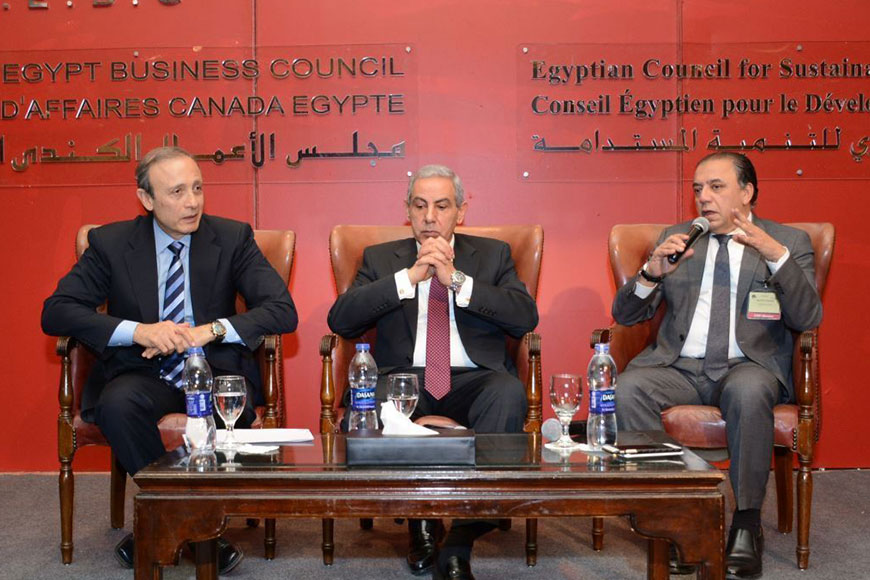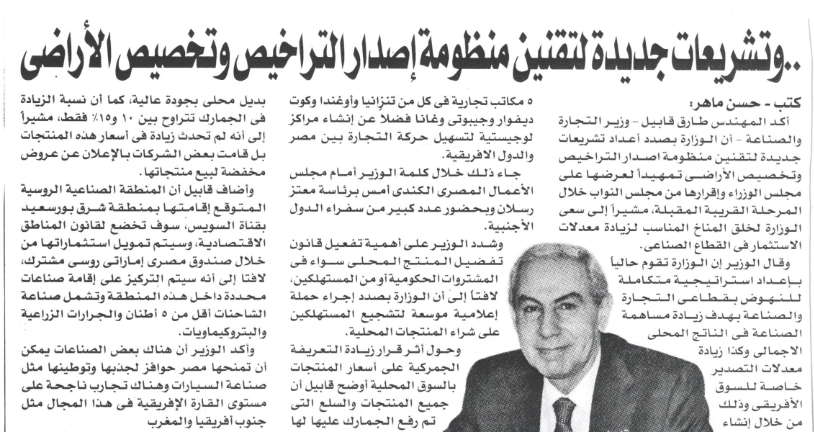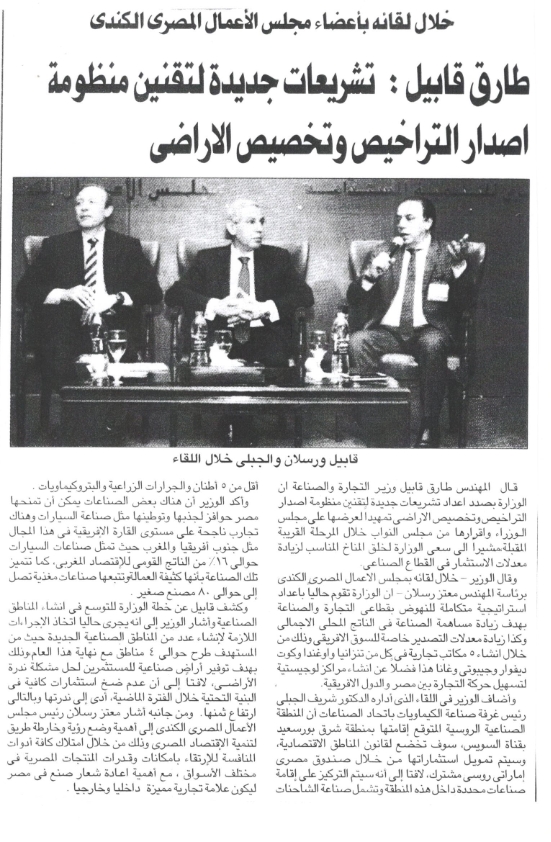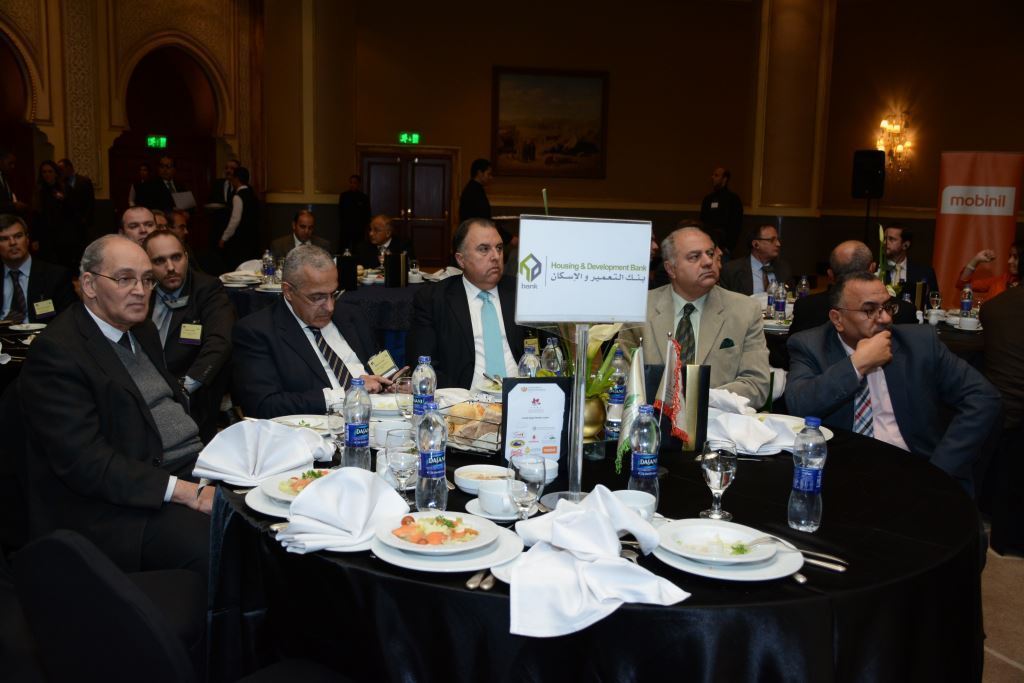
Date
Speaker(s)
Designation
Description
To address the current state of the Egyptian industry and trade sector and its current challenges, the Canada Egypt Business Council (CEBC) and the Egyptian Council for Sustainable Development (ECSD) hosted a panel discussion featuring H.E. Tarek Kabil Minister of trade and industry. Former ministers and senior officials attended the event, including Dr. Hany Helal, Eng. Alaa Fahmy, Cons. Adly Hussein, Dr. Safwat El Nahas, and Dr. Ali El Saiedi. Also H.E. Ghada Waly was among the attendees.
Ambassadors of Albania, Bangladesh, Bosnia, Slovenia, Croatia, Dominican Republic, Ecuador, Estonia, Georgia, Ghana, Italy, India, Portugal, Armenia, and Slovenia were also in attendance. They were joined by CEBC and ECSD’s esteemed members, guests, businessmen and reporters. Dr. Sherif El Gabaly CEO of Polyserve Chemicals in Egypt also co-hosted the panel discussion. Following brief opening remarks from Eng. Motaz Raslan, Minister Kabil took the floor and began with a brief overview of the global market. He noted that the world’s economy has been suffering from a slowdown for the last two years. The Euro currency has hit an all-time low, which affects some countries such as Egypt because the EU is one of our biggest importers constituting 13 percent. He added that the Chinese economy has been slowing down as well due to rising labor costs there. This has already prompted businesses to move their factories from China to other neighboring countries such as Thailand. Other currencies that faced devaluation include the Russian Ruble and the Turkish Lira. Among all this, political disturbances in almost all states neighboring Egypt have a negative outcome on Egypt’s economy as well.
When it comes to Egypt’s economy, the minister said that the last four years especially have been very challenging. Despite budget deficit decreasing from 12.2 to 11.50 percent, there is still a lot of room for improvement since the worldwide benchmark for deficit is at around five percent. The cash reserve is around 17.4 billion EGP, which has decreased from around 36 billion EGP before the revolution. This constitutes great pressure on the economy. Despite the decrease of subsidies in some areas such as fuel, subsidies from the government have risen in its value from 90 billion to 150 billion. Salaries have risen from 80 billion to 214 billion in the passing few years. The internal debt of Egypt has risen from around 600 billion in June 2010 to 1.9 trillion, while foreign debt has reached 47 billion. Kabil expressed that both figures are huge; exceeding the benchmark any country should be in. Thereby in total, 75 percent of Egypt’s budget goes to salaries, subsidies, and debt interest. This unfortunately only leaves 25 percent of the budget on citizens’ needs such as infrastructure etc.
Despite all these figures, the minister expressed that there is a silver lining with some positive indicators in the Egyptian economy. He noted a healthy growth rate of 4.2 percent during last year. Another positive indicator was the major national projects that took place recently. These include the new Suez Canal, new power plant openings, natural gas discoveries, and renewable energy plants. Also plans to build three new cities in the north coast, the Red Sea, and the newly planned administrative capital. This is also besides expansions in current ports around Egypt and the creation of new ones.
With a newly elected house of representatives, Kabil announced his plan to present them with new policies to help the Egyptian economy. These would include some stages of reform that won’t prove popular in the Egyptian streets and with many people, but they are a necessity. These include a decrease of subsidies by the government, the implementation of the Value Added Tax (VAT), the increase of importing and decrease of exporting in order to decrease the trade balance deficit. That’s because the balance of trade deficit in the last year alone increased from 38 billion to 48 billion.
When it comes to the ministry of Industry and Trade, the minister announced that they are currently in the phase of outlining and implementing a new strategic plan to aid investment all over Egypt. The plan would act as a guide to investors, pointing them to where to invest and what to invest in. The plan would also highlight the competitive advantage of each governate in Egypt based on its industries, capabilities, and location.
Kabil added that one of his ministry’s goals is to make the current environment in Egypt facilitating to industries. Currently he noted that the two biggest obstacles facing industries in Egypt are registration procedures and locating suitable land. It takes an average of 634 days to register a new business investment, which the minister commented is a very long time for any investor whether local or foreign. Finding suitable land is also problematic because there has been little to no new updates on infrastructure in Egypt, thereby leading to lesser available lands, which in turn drives prices of suitable lands too high. Kabil stated that land needs to be a lot cheaper in order to entice investing which is the case in most places around the world. In the upcoming months, Kabil announced that the ministry will be offering land plots for investors in order to boost the economy.
He also added that the ministry is working on a plan to encourage Egyptian products and boost their market share in order to decrease Egypt’s heavy reliance on exports. The current breakdown of imports in Egypt is as follows: 28 percent small industries, 45 percent small to medium industries, 25 percent medium to high industries, and 2 percent high industries. Kabil pointed out that the ministry is also planning to outline the industries that are in Egypt’s best benefit to focus on and where exactly to market it.
Egypt currently has a lot of free trade agreements with the COMESA, Arab countries, EU, and Turkey. There are plans for new trade agreements to take place soon in Latin America, Eurasia, and other parts of Africa. Regarding trade there is also a plan to determine the markets that Egypt should expand in. Kabil stressed that Africa is being targeted as a big market for Egyptian products. He said that he wishes to see Egypt as the “factory of Africa” since Egyptian products have a competitive edge in the market. To aid with that, the ministry has also restructured their commercial representation in Africa not only to cut costs but to increase effectiveness.
The floor was then opened for a questions session where a wide range of vital topics were raised such as how entice local and foreign investors to start new businesses and ways to help put the Egyptian product on the global map.



















